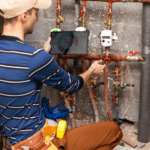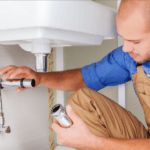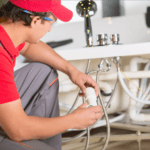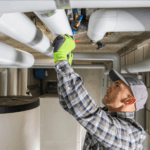Welcome to Rapid Flow Plumbing Townsville, where we help property owners identify and address hot water system issues before they become emergencies. Understanding the warning signs of hot water system problems helps prevent unexpected failures while optimizing system performance and efficiency.
Understanding Hot Water System Lifespan
Hot water systems represent significant investments in property infrastructure, with typical lifespans ranging from 8-15 years depending on system type, usage patterns, and maintenance history. Understanding normal system aging helps property owners plan for eventual replacement while maximizing current system efficiency through proper maintenance. Professional assessment of system condition, costing A$150-A$300, helps develop appropriate maintenance or replacement strategies.
Warning Signs Analysis
Temperature Inconsistency Indicators
Temperature fluctuations during hot water use often signal developing system problems requiring professional attention. When users experience sudden temperature changes during showers or sink use, this typically indicates failing heating elements or thermostat issues. These inconsistencies can also stem from sediment buildup affecting heating efficiency. Professional diagnosis of temperature issues, typically costing A$150-A$200, helps prevent complete system failure while optimizing performance.
Understanding Noise Problems
Unusual noises from hot water systems provide valuable clues about developing issues. Rumbling or popping sounds typically indicate significant sediment accumulation at the tank bottom, reducing heating efficiency while increasing energy costs. Whistling or screaming noises often signal dangerous pressure buildup requiring immediate professional attention. Crackling sounds during heating cycles may indicate scale formation on heating elements, a common issue in Townsville’s hard water conditions.
Visual Warning Recognition
External signs of hot water system deterioration require careful monitoring and prompt attention. Rusty water indicates internal tank corrosion, often leading to eventual failure. Water stains or moisture around the system base suggest developing leaks requiring immediate repair. Tank corrosion or rust spots on external surfaces indicate potential failure points needing professional evaluation. Regular visual inspections help identify these issues early, preventing costly water damage.
Performance Issue Identification
Declining hot water system performance manifests through various indicators requiring professional assessment. Reduced hot water flow often indicates valve problems or pipe restrictions from scale buildup. Longer recovery times between uses suggest failing heating elements or thermostat issues. Increasing energy bills without usage changes may indicate declining system efficiency requiring maintenance or replacement. Professional efficiency testing helps identify specific performance issues while guiding improvement strategies.
Age-Related Considerations
System Lifespan Understanding
Hot water system longevity varies significantly based on multiple factors affecting performance and reliability. Storage systems typically last 8-12 years in Townsville’s conditions, while continuous flow systems often reach 12-15 years with proper maintenance. Understanding typical lifespan expectations helps property owners plan for eventual replacement while maintaining appropriate maintenance schedules. Professional assessment of older systems, costing A$200-A$300, helps evaluate remaining serviceable life.
Usage Pattern Effects
Property usage patterns significantly impact hot water system longevity and performance. Heavy usage accelerates wear while increasing maintenance requirements and potentially shortening system life. Professional load analysis helps match system capacity with actual needs, optimizing performance while extending service life. Regular maintenance becomes increasingly important with heavy usage, typically requiring service every 6-12 months.
Professional Assessment Process
Component Testing Procedures
Comprehensive hot water system evaluation involves testing multiple components affecting performance and reliability. Professional technicians assess heating elements, thermostats, valves, and pressure relief devices using specialized equipment. Anode rod condition receives particular attention, as these sacrificial components protect tanks from corrosion. Complete system assessment typically costs A$200-A$400 but provides valuable information guiding maintenance or replacement decisions.
Efficiency Evaluation Methods
Modern testing equipment enables precise measurement of hot water system efficiency, helping identify performance issues while guiding improvement strategies. Thermal imaging identifies heat loss areas requiring additional insulation. Flow testing reveals restrictions requiring attention. Energy consumption analysis helps evaluate operating costs compared to newer, more efficient systems. This comprehensive testing supports informed decisions about system maintenance or replacement.
Continuing with detailed explanations for each section…
Safety Assessment Protocols
Professional safety testing of hot water systems involves comprehensive evaluation of multiple protective features. Pressure relief valve testing ensures proper operation under various conditions, preventing dangerous pressure buildup. Temperature control systems undergo detailed checking to prevent scalding risks, particularly important for homes with children or elderly residents. Electrical safety testing identifies potential hazards requiring immediate attention, with typical safety inspections costing A$150-A$250.
Cost Analysis Comparison
Professional assessment includes detailed cost analysis comparing repair versus replacement options. For systems nearing end-of-life, repair costs often approach 30-40% of replacement costs, suggesting replacement as a more cost-effective solution. Energy efficiency improvements from modern systems, typically 20-30% better than older units, factor significantly into replacement decisions. Complete cost analysis helps property owners make informed decisions about system future.
Long-term Planning Considerations
System Upgrade Evaluation
Evaluating potential system upgrades involves analyzing current and future property needs. Modern systems offer significant improvements in energy efficiency, often reducing operating costs by 25-40% compared to older units. Solar-boosted systems, while requiring initial investments of A$3,000-A$6,000 above standard systems, often pay for themselves through reduced energy costs within 4-6 years in Townsville’s sunny climate.
Environmental Impact Assessment
Environmental considerations increasingly influence hot water system decisions. Modern systems produce significantly lower carbon emissions through improved efficiency and advanced technology. Solar-boosted and heat pump systems reduce environmental impact by 60-80% compared to traditional electric systems. Professional assessment helps property owners understand environmental implications while identifying cost-effective green solutions.

Frequently Asked Questions
Repair versus Replacement Decisions
Making informed decisions about repairing or replacing hot water systems requires careful consideration of multiple factors. For systems under 6-7 years old, repairs typically prove cost-effective when addressing isolated issues. However, older systems experiencing multiple problems often justify replacement, particularly when considering efficiency improvements and reduced operating costs of modern systems. Professional assessment helps evaluate specific situations while identifying most cost-effective solutions.
Understanding Repair Costs
Hot water system repair costs vary significantly based on specific issues and system types. Minor repairs like thermostat replacement typically cost A$200-A$400, while major repairs including element replacement might reach A$500-A$800. Understanding typical repair costs helps property owners evaluate repair versus replacement options while budgeting for necessary maintenance.
System Lifespan Factors
Multiple factors influence hot water system longevity in Townsville’s conditions. Water quality significantly impacts internal components, with high mineral content accelerating wear. Usage patterns affect system stress levels, while maintenance history plays crucial role in longevity. Professional assessment helps identify factors affecting specific systems while developing strategies for maximizing service life.
Performance Impact Understanding
System performance often declines gradually, making changes difficult to notice initially. Reduced hot water volume, longer recovery times, and increasing energy costs often indicate developing issues requiring attention. Professional efficiency testing helps identify performance declines while guiding improvement strategies.
Upgrade Value Assessment
Evaluating upgrade benefits involves analyzing potential savings against investment costs. Modern systems typically reduce energy consumption by 20-40% compared to older units, while offering improved reliability and performance. Professional assessment helps property owners understand potential benefits while identifying most cost-effective upgrade options.
Conclusion
Understanding hot water system warning signs helps prevent unexpected failures while optimizing system performance and efficiency. Regular professional assessment ensures early problem identification while supporting informed maintenance and replacement decisions. Property owners benefit from understanding these indicators through improved system reliability and reduced operating costs.
For more information about plumbing services at Rapid Flow Plumbing Townsville, check them out below:








